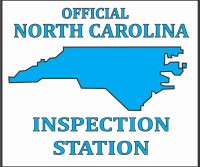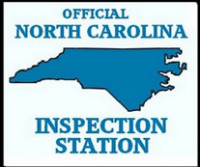
As a resident of North Carolina and a vehicle owner, you are required to have a North Carolina State Inspection done in order to obtain your vehicle’s yearly registration. Car owners are not able to renew their vehicle’s registration or get their yearly sticker for their license plate registration until the vehicle receives a satisfactory certificate of inspection.
Here is what you need to know. Every year, within 90 days of your annual registration date you need to bring your vehicle in to be fully inspected.
The North Carolina State Inspection looks over items such as:
- Brakes
- Steering System
- Turning Lights
- Windshield Wipers
- Aftermarket window tinted Window Grade
- Lights (headlights, tail, brake, plate, and turn signals)
- Tire Condition
- Horn
- Mirrors
If your car is more than 35 years old you are not required to have it inspected.
North Carolina is fighting ozone-forming emissions from gasoline-operated cars and light-duty trucks, Wake and Johnston County require a vehicle emissions check as well.
How is a vehicle’s emissions checked? Inspections are conducted using the vehicle’s On-Board Diagnostic (OBD) system, computerized equipment installed on all new vehicles since 1996.
There are currently 22 counties in North Carolina that require vehicle owners to pass both an Emissions Inspection and a Safety Inspection.
Where can I get my car inspected? Did you know Fast Lube Plus is licensed to perform both OBD and Safety Inspections? We perform these services in compliance with state guidelines. Fees for these services are regulated by the state of North Carolina.
What happens if my vehicle fails an NC Vehicle Safety Inspection? If your vehicle fails inspection, your vehicle can be presented for re-inspection within 60 days of the original failed inspection. Once your vehicle passes, you will be eligible to apply for your yearly vehicle registration.
Stop by any six of Fast Lube Plus’ convenient locations to have your North Carolina State Inspection done. No appointment is necessary!

Your NC State Inspection can seem a bit…obtuse. If your car is running fine – especially if it’s brand new – it might seem like a waste of time for it to be inspected. This is especially true because it’s just that: an inspection! Nothing actually changes about your car afterwards.
However, a state inspection is actually a complex process requiring advanced automotive knowledge and training. The process is subject to strict legal regulation, and shops like Fast Lube Plus must be familiar with the regulation to perform inspection.
There’s more to your inspection than just a glance.
Safety vs. Emissions Inspection
North Carolina has two types of vehicle inspections: safety and emissions.
Safety inspections are required everywhere in the state. They focus primarily on the physical aspects of your car: brakes, tires, seatbelts, headlights, and anything else that could make your car dangerous for public operation.
Emissions tests are a bit different. Your car releases a certain amount of harmful greenhouse gases, the limits of which are mandated by the federal government. Because emissions are most concentrated in cities, emissions tests are only required in the state’s 48 most populous counties. Naturally, most of the Triangle falls in that category.
Both inspections have some minimum requirements. For instance, cars made before 1996 don’t have the in-car computers required for emissions testing. Cars older than 35 years also do not require safety inspections. This might sound dangerous, but most cars that old are kept as antiques or showpieces.
Station Qualifications
Becoming authorized to inspect a car is a lot like learning to drive one. It starts with an eight-hour class that can be taken at a community college, followed by a written exam. A local inspector or auditor then administers a live inspection test.
Inspectors must also renew their licenses. Safety inspection licenses must be renewed every four years. Emissions inspections are even more stringent, with an additional class and test and a two-year renewal period.
How We Compare to Other States
State inspection laws vary dramatically, but most share North Carolina’s policy of an annual safety and emissions inspection. However, some states are quite different.
- California: new cars sold in California actually follow an entirely different emissions standard, one much tougher than the federal requirements. They also require emissions inspections for all cars made after 1975. This is due to Callifornia’s extremely dense urban areas.
- Georgia: only cars in and around Atlanta require emissions testing.
- Nevada: only in Las Vegas and Reno, likely because the rest of the state is quite empty.
- Alaska, Arkansas, Florida, Iowa, Kentucky, Michigan, Minnesota, Mississippi, Montana, North and South Dakota, and South Carolina: no inspections of any kind!
